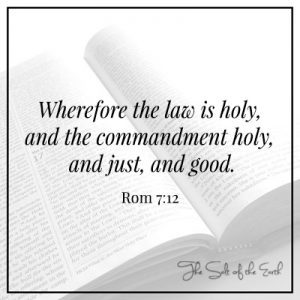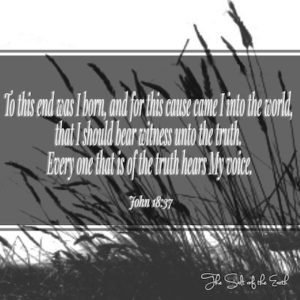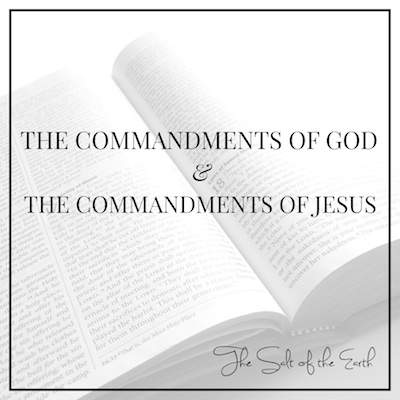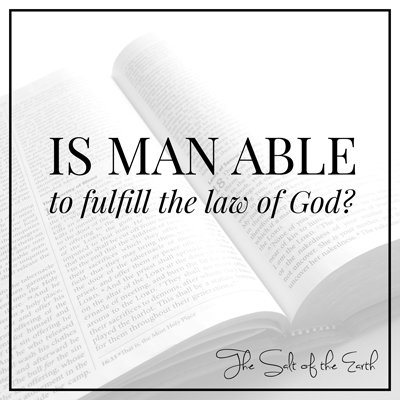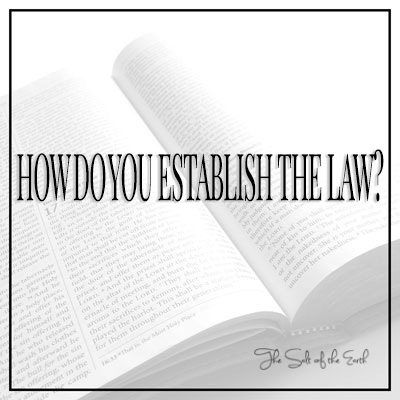Katika Waebrania 7:12, it is written that a change of priesthood means a necessary change of law. But what does this change of law in the change of priesthood mean? How is the law changed? Does the law, which God gave to Moses, no longer apply? Did Jesus abolish the law? Or does the Mosaic law still apply to Christians? What is the law of the Kingdom of Heaven, ambapo Yesu Kristo ni Mfalme na anatawala? Which law applies in the New Covenant and should Christians obey?
The Levitical priesthood and the law of Moses in the Old Covenant
In the Old Covenant God had appointed Moses and Aäron from the tribe of Levi, to deliver His people from slavery and the reign of Pharaoh and lead them to the promised land.
God revealed Himself through the visible signs and wonders and took His people by the hand and delivered His people and led them to the promised land.
While they were in the wilderness, God made His nature and His will known, by giving His law to Moses. Through the law, the will of God was made known and therefore sin was revealed. This law belonged to the covenant between God and His people Israël.
God appointed Aaron as high priest and his sons as priests and so the Levitical priesthood was instituted.
Katika Agano la Kale, the law of Moses applied and the people lived under the Levitical priesthood and animal sacrifices were made and the blood of animals made a temporal atonement for the sins and iniquities of the people(Soma pia: ‘Nini siri ya sheria?’ and ’What is the difference between the sacrifices of animals and the sacrifice of Jesus Christ?')
Although God had chosen His people, His people belonged to the generation of fallen man (Mzee), whose spirit is dead.
God’s people were soulish and since they could only walk after the flesh, God gave them commandments, (sacrificial and food) Sheria, matambiko, precepts, na sikukuu, which applied to the flesh of the carnal man.
Therefore the law of Moses with all its commandments, Sheria, matambiko, precepts, Sherehe, na kadhalika. was meant for the old man, who is unspiritual and carnal and can only walk after the flesh, in which sin and death reign.
The law of sin and death reigns in the flesh of the old man
Kwa sababu ya ukweli, that the sinful nature reigns in the flesh, the flesh doesn’t love God, but loves itself. The flesh is prideful, mwasi, unfaithful, wasio na imani, ubinafsi, jealous, mwenye tamaa, and unforgiving and wants to lie, kuiba, cheat, kutamani, kufanya uzinzi, uasherati, talaka, chuki, kuua, na kadhalika.
Therefore God commanded in the law of Moses, ‘Thou shalt not…’ (Soma pia: ‘Kwa nini Mungu alisema, thou shall not… and why did Jesus say, thou shall…? na ‘Ukweli wa ukweli juu ya sheria ya dhambi na kifo‘)
A New Covenant and a change of priesthood
If therefore perfection were by the Levitical priesthood, (for under it the people received the law,) what further need was there that another priest should rise after the order of Melchisedec, and not be called after the order of Aaron? For the priesthood being changed, there is made of necessity a change also of the law. For he of whom these things are spoken pertaineth to another tribe, of which no man gave attendance at the altar (Waebrania 7:11-13)
The law of Moses was part of the Old Covenant, which was meant for God’s carnal people. But God’s carnal people could not keep the law of God. God’s people were prideful, rebellious and exalted themselves above the law of God and made their own laws and committed idolatry and lived like the pagan nations, and so God’s people committed spiritual adultery and broke the covenant with God (Oh. Yeremia 3:7-11; 11:10, Ezekieli 44:6-8, Hosea 8:1, Waebrania 8:9).
The people didn’t love God and therefore they didn’t listen to His voice and didn’t keep His commandments.
But God knew all this beforehand. God knew that the Old Covenant wouldn’t stand, because of the weakness of the flesh.
Therefore God prophesied at the beginning of creation after the fall of man about the coming of the Seed that would bruise the head of the devil (Soma pia: ‘Ina maana gani kichwa cha shetani kimechubuliwa kwa sababu kisigino cha Yesu kilichubuliwa?' na 'Waiting, for the promise of the Messiah')
And this promise of God was fulfilled, when Jesus Christ, Mwana wa Mungu na Neno lililo hai, came to the earth to heal what was broken and restore the relationship between man and God and the position of man on earth through His perfect redemptive work (Soma pia: ‘Nini maana ya kweli ya msalaba?', ‘Yesu alileta amani ya aina gani duniani?‘ Na ‘Yesu arudisha nafasi ya mtu aliyeanguka‘)
Jesus didn’t belong to the tribe of Levi and was not born of the seed of Levi, but Jesus belonged to the tribe of Judah and was born of the Seed of God (Soma pia: Yesu alikuwa Mwanadamu kamili?)
After the crucifixion and resurrection from the dead, Jesus stayed for forty days on earth, teaching His disciples. After forty days Jesus was caught up in a cloud and ascended to heaven and took place at the right hand of the Father on the throne of mercy (mercy seat) in the Holy of Holies and became both High priest and King after the order of Melchizedek (Soma pia: ‘Nini maana ya Melkizedeki?).
The change of priesthood meant a change of law
Kwa njia ya Yesu Kristo, a New Covenant was instituted, which is sealed with His own blood. The change of covenant and the change of priesthood also meant a change of law.
The Levitical priesthood and the Mosaic law were part of the covenant between God and His carnal people Israel and as a sign the circumcision in the flesh.
Kila mmoja, who belonged to the house of Israel and was circumcised in the flesh lived under the Levitical priesthood and had to keep the law of Moses with all its commandments, precepts, (sacrificial and food) Sheria, rituals and feasts.
The Levitical priesthood and the law of Moses were meant for the old man, who is carnal and in whom the sinful nature reigns, and not for the new man, who had become a new creation in Christ and in whom God’s nature reigns.
In the Old Covenant God made His will known to His carnal people Israel by giving the law and in the New Covenant God made His will known to His people by giving His Holy Spirit, whereby His laws are written in the mind and heart of the new man (Soma pia: 'Nini kimetokea 50 days after Passover?)
Kupitia kuzaliwa upya katika Kristo, the old man dies
Kwa hivyo, Ndugu, Ujasiri wa kuingia katika utakatifu kwa damu ya Yesu, Kwa njia mpya na ya maisha, ambayo ameiweka wakfu kwa ajili yetu, Kupitia kwa Veil, Hiyo ni kusema, his flesh; na kuwa na kuhani mkuu juu ya nyumba ya Mungu; Hebu tukaribie kwa moyo wa kweli katika uhakikisho kamili wa imani, mioyo yetu imenyunyiziwa kutoka kwa dhamiri mbaya, na miili yetu imeoshwa kwa maji safi (Waebrania 10:19-23)
Kwa imani katika Yesu Kristo, toba, and regeneration in Christ, man identifies himself/herself with the death and resurrection of Jesus Christ, whereby the old man (Mwili) dies and the new man (Roho) anafufuliwa kutoka kwa wafu.
The old man lays down his life symbolically through the baptism in water. In baptism, the old man dies, and therefore the law of sin and death, which reigns in the flesh of the old man dies. For by the death of the flesh man is loosed from the law, ambayo inatawala katika mwili (Soma pia: ‘Ubatizo ni nini?)
Through the death of the flesh, the law of sin is abolished and sin and death no longer reign in the life of the person, who has become a new creation in Christ.
But although the law of sin and death no longer reigns through the death of the flesh, the will of God and the nature of God remain unchanged.
This means that the moral commandments (Sheria) that represent the nature and the will of God still apply in His Kingdom and in the New Covenant.
Kupitia kuzaliwa upya katika Kristo, the new man is raised from the dead
Tazama, the days are coming, declares the Lord, when I will make a new covenant with the house of Israel and the house of Judah, not like the covenant that I made with their fathers on the day when I took them by the hand to bring them out of the land of Egypt, My covenant that they broke, though I was their husband, declares the Lord. For this is the covenant that I will make with the house of Israel after those days, declares the Lord: I will put My law within them, and I will write it on their hearts. And I will be their God, and they shall be My people. And no longer shall each one teach his neighbor and each his brother, akisema, ‘Know the Lord,’ for they shall all know Me, from the least of them to the greatest, declares the Lord. For I will forgive their iniquity, and I will remember their sin no more.” (Yeremia 31:31-34)
For this is the covenant that I will make with the house of Israel after those days, asema Bwana; I will put My laws into their mind, and write them in their hearts: and I will be to them a God, and they shall be to Me a people: And they shall not teach every man his neighbour, Kila mtu ndugu yake, akisema, Mjue Bwana: for all shall know Me, from the least to the greatest. For I will be merciful to their unrighteousness, and their sins and their iniquities will I remember no more. In that He saith, A new covenant, He hath made the first old. Now that which decayeth and waxeth old is ready to vanish away (Waebrania 8:10-13)
And every priest standeth daily ministering and offering oftentimes the same sacrifices, which can never take away sins: But this man, after he had offered one sacrifice for sins for ever, sat down on the right hand of God; From henceforth expecting till his enemies be made his footstool. For by one offering he hath perfected for ever them that are sanctified. Whereof the Holy Ghost also is a witness to us: for after that he had said before, This is the covenant that I will make with them after those days, asema Bwana, I will put my laws into their hearts, and in their minds will I write them; And their sins and iniquities will I remember no more. Now where remission of these is, there is no more offering for sin (Waebrania 10:11-18)
Through the resurrection of the spirit from the dead and the indwelling of the Holy Spirit, you have received God’s nature, and His will is written in your mind and your heart. You were dead, but because of the resurrection in Christ from the dead, you have been raised from the dead and entered the life in Christ. Now a new law reigns in your life, namely the law of the Spirit in Christ Jesus which is the law of life.
The law of the Spirit in Christ Jesus no longer commands, “thou shalt not…”, because the flesh with all its sinful lusts and desires no longer reigns in you because the flesh is dead and no longer lives.
But the law of the Spirit in Christ says, “thou shall…”, because the spirit who was dead, has become alive in you and reigns in you.
The new man has God’s nature and loves God with all his heart, nafsi, akili, and strength and loves his neighbor as himself. Therefore the new man submits to God and speaks the truth and is obedient, loyal, faithful, grateful, satisfied, patient, selfless, forgiving, and walks in love (the righteous love of God).
By walking after the Spirit in submission to Jesus Christ; the Word in the will of God the new man shall fulfill the law, kama Yesu, Who didn’t come to abolish the law but to fulfill the law (Mathayo 5:17, Warumi 3:31).
The law of God, which represents His will and has reigned from the beginning in the Kingdom of Heaven, shall always reign in the Kingdom of Heaven.
The fall, the covenant, the coming of the law of Moses, and the coming of Jesus Christ and His redemptive work have not changed anything about that. The only thing that changed is the creation of God and the status and the position of man (Soma pia: ‘Unaweza kutumia ulimwengu uliovunjika kama kisingizio?).
The will of God and His nature shall never change and therefore His commandments, which are the same commandments of Jesus, shall not change. God’s Word stands forever (Oh. Zaburi 119:89, Isaya 40:6 (Soma pia: ‘Amri za Mungu na Amri za Yesu‘)
The law of the Spirit of life reigns in the new man
Now the God of peace, that brought again from the dead our Lord Jesus, that great Shepherd of the sheep, through the blood of the everlasting covenant, Make you perfect in every good work to do his will, working in you that which is wellpleasing in His sight, Kwa njia ya Yesu Kristo; to Whom be glory for ever and ever. Amina (Waebrania 13:20-21)
Kwa hiyo sasa hakuna hukumu kwa wale walio katika Kristo Yesu., ambao hawatembei baada ya nyama, Lakini baada ya Roho. Kwa maana sheria ya Roho wa uzima katika Kristo Yesu imeniweka huru kutoka kwa sheria ya dhambi na mauti.. For what the law could not do, in that it was weak through the flesh, God sending His own Son in the likeness of sinful flesh, and for sin, condemned sin in the flesh: That the righteousness of the law might be fulfilled in us, ambao hawatembei baada ya nyama, Lakini baada ya Roho. Kwa maana wale walio baada ya mwili huyafikiria mambo ya mwili.; Lakini wale walio na Roho mambo ya Roho. Kwa maana kuwa na nia ya kimwili ni kifo; Lakini kuwa na nia ya kiroho ni maisha na amani (Warumi 8:1-6)
The new man has been made free in Christ and no longer lives in bondage to sin and death, but is raised from the dead and delivered from the power of darkness by the power of God and lives in bondage to Jesus Christ; the Life in the light.
Therefore the new man shall no longer obey the devil and death and do the works of the flesh and bear the fruit of the death, ambayo ni dhambi. If someone keeps bearing the fruits of death, ambayo ni dhambi, then this means that the death still reigns in the life of the person and the person still lives as the old creation. Because the new man shall submit to Jesus Christ and obey Jesus Christ, neno, na Maisha, and bear the fruit of the Spirit.
The new man no longer lives as the old creation after the flesh in the Old Covenant under the Levitical priesthood, where the law of Moses reigns and the person has to keep all the sacrificial laws, Sheria ya chakula, matambiko, Sherehe, na kadhalika., which are meant for the old man. But the new man lives in the New Covenant under the Messianic Priesthood, where the law of the Spirit of in Christ Jesus reigns and the new man lives as priest and reigns as king and therefore walks holy in the authority of King Jesus and the power of the Holy Spirit in the will of God on earth.
‘Kuweni chumvi ya dunia’
